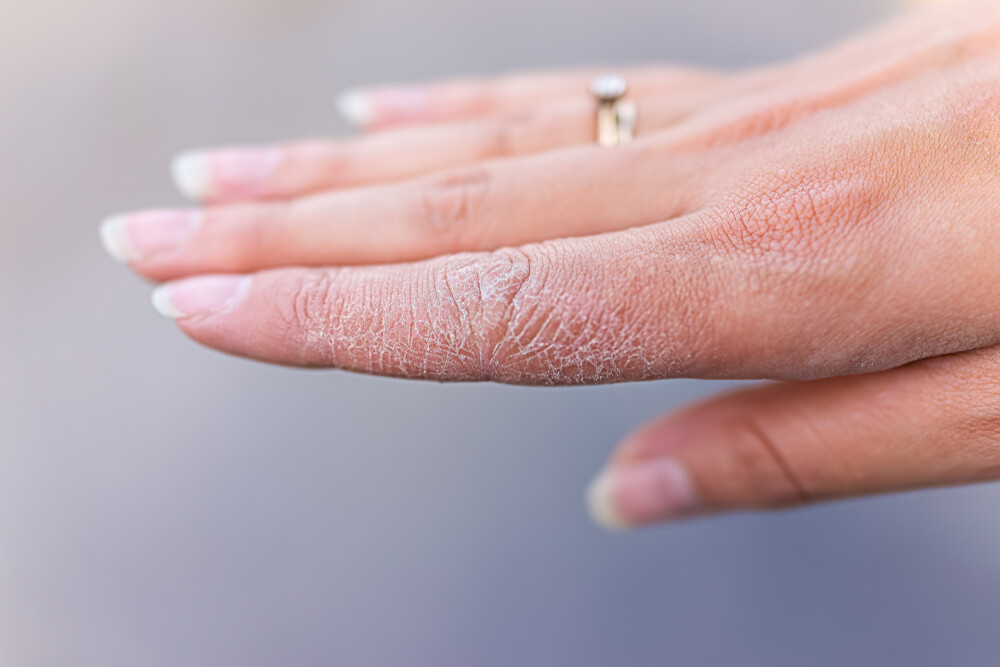The hands are red and aching, cracked areas spread and itching and feelings of tension become noticeable. In the worst case, open wounds and inflammations form! You can find out here what causes dry and cracked hands and how to treat them.
Cracked hands: Causes
- The hands have only a few sebaceous glands on the back of the hand – they are completely absent in the palm of the hand. The sebaceous glands are normally responsible for covering the skin with a thin layer of fat that protects it from drying out. In addition, the sebaceous glands continue to reduce their production at low temperatures, which means that the hands are even less protected in winter. In addition, the skin on the back of the hand is also very thin and has hardly any fatty tissue. These circumstances are responsible for the fact that the skin on the hands has little protection, is stressed even more quickly in extreme temperatures and loses moisture. Especially cold, dry heating air and additional stress, such as washing your hands with too hot water, puts a lot of strain on our hands and the skin loses moisture. This leads to dry and cracked hands.
- The skin generally suffers from unbalanced or poor nutrition. A vitamin and iron deficiency can also have consequences for the skin. Other factors that can promote chapped areas are stress or hormone fluctuations, for example.
- Extremely cracked hands and dry skin can also be a symptom of a skin disease: For example, contact eczema, neurodermatitis or psoriasis. Other causes, such as an underactive thyroid gland, are also possible. Therefore, do not hesitate to consult a doctor.
- With age, the skin’s ability to store moisture and produce fat decreases. Therefore dry and chapped hands are not uncommon in old age.
Treating cracked hands: You can do that
A lot of creaming helps a lot
High-fat creams protect our hands in winter. It is best to apply cream to your hands several times a day, for example after washing your hands. In very cold temperatures you can also protect your hands with milking grease. In the evening you should give them an extra portion of care and moisture and cream them with hand care cream. If you wrap your hands in a warm cloth after applying the cream, it will also help the skin.
Intensive care
Give your hands an intensive care once in a while. High-quality olive oil (organic quality) offers you good immediate help, but coconut oil and jojoba oil as well as shea butter are also suitable. Rub the backs of your hands with it and let the product soak in. Alternatively, a banana-quark mask is also available once a week: Crush a piece of banana with a fork until you get a pulp and mix it with some cream curd. Put the mask on your hands and let it work in for about 20 minutes. Then remove the mask and rinse your hands.
Important: If you cannot get the skin problems under control, you should consult a dermatologist!
Cracked hands: 3 tips to prevent
- Drink a lot: drink a lot of fluids! Especially in the cold winter, we sometimes do not pay enough attention to our fluid balance, which ensures a good metabolism and also healthy skin. It is therefore particularly important to drink two to 2.5 litres of fluid per day. It is best to drink water or unsweetened tea.
- Protect your hands: In cold temperatures, gloves should be your faithful companions. If your hands stay warm, they will not be additionally stressed by the cold. You should also always protect your hands with household gloves when handling cleaning products or other chemicals.
- Careful when washing your hands: Washing hands is extremely important for preventing disease, but washing your hands incorrectly can only make chapped hands worse: Hot water only attacks your skin even more, so use lukewarm water! You should also only use a hand soap that is pH neutral. Other soaps can attack the skin’s natural acid mantle, which can damage your hands even more. You should also be careful not to wash your hands excessively: this is excessive hygiene, which is unnecessary.

